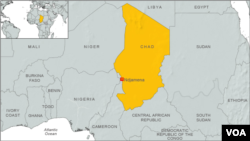Eleven villagers in southern Chad have been killed by "bandits," in a region troubled by violence between herders and sedentary farmers, the military said on Thursday.
The attack occurred on Wednesday, coinciding with an announcement by Chad that it had joined with neighboring Central African Republic (CAR) in an unprecedented crackdown.
"Armed bandit cattle rustlers attacked the village of Mankade in Laramanaye district, killing 11 villagers and making off with their cattle," Defense Minister Daoud Yaya Ibrahim told AFP.
"The security forces pursued them, killing seven bandits and capturing eight others," he said, adding that the stolen cattle had been recovered.
The incident occurred in the far south of the vast Sahel country, around 60 kilometers (40 miles) from the frontier with CAR.
Laramanaye's deputy prefect, Djimet Blama Souck, told AFP that 12 villagers, including women and children, had been killed.
On May 8, 17 villagers in the region died in a similar attack, which the Chadian army blamed on Chadian "bandits" who had crossed from the CAR.
On Wednesday, the defense minister told AFP that his troops last week had pursued the assailants across the border, and working with the CAR army had killed around a dozen of them.
That operation is now over, he said on Thursday, adding that "dozens of thieves were killed," and the Chadian forces had returned home with 30 prisoners and 130 stolen cattle.
The assertion could not be verified independently in this remote area, and it has not been confirmed by the CAR government, which on Wednesday said only that a "consultation mission" from both countries' armies had met "in order to calm the situation."
Ties between the CAR and Chad, two of the poorest and most troubled countries in the world, have often been tense.
Relations have been marked by mutual accusations that the other country is harboring armed rebels.
The fertile border areas of Chad, Cameroon and CAR have been gripped by confrontation between predominantly Muslim nomadic herders and sedentary farmers who are typically Christian or animist.
Tensions are historically rooted in rivalry over land.
The farmers often accuse the herders of letting their cattle trample their crops and eat them, while the herders say they have the traditional right to graze there.
